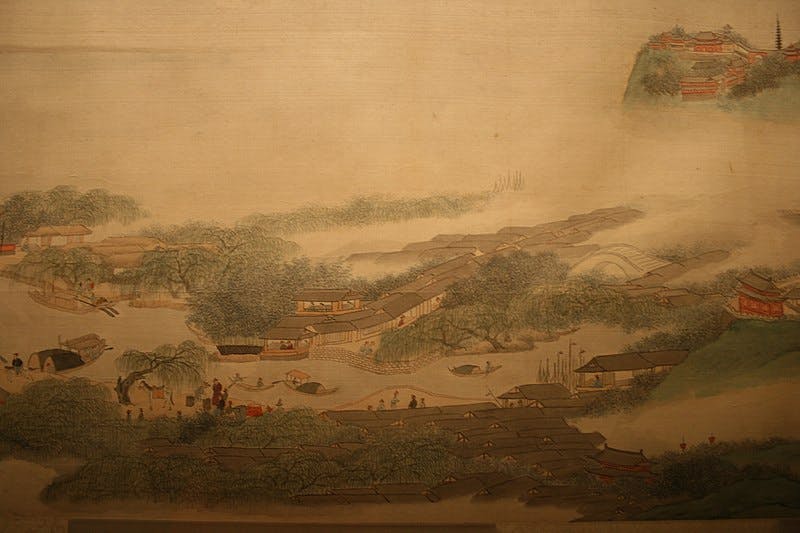Poem of the Day: ‘The River-Merchant’s Wife: A Letter’
Ezra Pound, in poems like this, borrowing from the Asian forms he admired, made the juxtaposition of imagery part of the modern idiom.

The journey of today’s Poem of the Day from the eighth-century Chinese of Li Bai (701–762) to the twentieth-century English of Ezra Pound is a convoluted one. This might be a more diplomatic way of saying, as some scholars do, that Pound wasn’t a particularly proficient translator from the Chinese. But it also happens to be the truth.
In 1913, while working in London as secretary to W.B. Yeats (1865–1939), who shared the younger poet’s interest in Asian art and literature, Pound became acquainted with Mary McNeil Fenellosa, widow of the art historian Ernest Fenellosa. The late Fenellosa, whose area of expertise had been Japanese art, left among his papers a number of notes and manuscripts, including Japanese Noh plays and poems by Japanese and Chinese poets. These his widow sent to Pound, to sort out, translate, and render publishable.
Pound’s limitations as a translator of Chinese poetry were compounded by the fact that Fenellosa, who had made some preliminary attempts, was fluent primarily in Japanese, not Chinese. So it’s perhaps inevitable that these poems, constituting Pound’s own 1915 collection, “Cathay,” would be more in the spirit of the dynamic equivalent than of fidelity to the original. This, perhaps, is a diplomatic way of saying that we learn more about Pound’s mind and interests from these poems than we learn about Li Bai’s.
Today’s poem, which we offer in belated commemoration of its author’s birthday on October 20, is a case in point. It’s telling that Pound’s epigraph, “after Li Po,” suggests that the poem is a response to the original, and not a faithful translation. While the setting is Chinese, and the plot concerns the cultural convention of an arranged marriage, the poem itself suggests a marriage of Japanese poetic conventions with Pound’s own artistic preoccupations.
In short, like his 1912 “Portrait D’Une Femme,” which appeared in this space on June 9, and like his famous haiku-esque 1913 “In a Station of the Metro,” this supposed translation is really, at its core, an Imagist poem. The moves it makes are, on the one hand, the moves of Japanese poetry, particularly haiku, which juxtaposes image with image and leaves the images to explain themselves through these juxtapositions. If the same moves are, on the other hand, also the moves of much contemporary American poetry, it’s because Ezra Pound, in poems like this, borrowing from the Asian forms he admired, made them part of the modern idiom.
What’s easy to lose sight of in all this, though, is that as a poem, “The River-Merchant’s Wife: A Letter” is simply beautiful. Its irregularly metered lines, undulant as the river itself, sketch a life story which is also a love story. Within the imposed form of the arranged marriage, love blooms and is realized most intensely through seasons of separation. All too swiftly its springtime has given way to autumn. In uncertainty and anxiety over her husband’s long absence, the young wife laments, “I grow older.” Still, she is certain of one thing: that when she hears from him — if she hears from him — she will come to meet him, “as far as Chō-fū-Sa.”
The River-Merchant’s Wife: A Letter
by Ezra Pound
After Li Po
While my hair was still cut straight across my forehead
I played about the front gate, pulling flowers.
You came by on bamboo stilts, playing horse,
You walked about my seat, playing with blue plums.
And we went on living in the village of Chōkan:
Two small people, without dislike or suspicion.
At fourteen I married My Lord you.
I never laughed, being bashful.
Lowering my head, I looked at the wall.
Called to, a thousand times, I never looked back.
At fifteen I stopped scowling,
I desired my dust to be mingled with yours
Forever and forever, and forever.
Why should I climb the look out?
At sixteen you departed
You went into far Ku-tō-en, by the river of swirling eddies,
And you have been gone five months.
The monkeys make sorrowful noise overhead.
You dragged your feet when you went out.
By the gate now, the moss is grown, the different mosses,
Too deep to clear them away!
The leaves fall early this autumn, in wind.
The paired butterflies are already yellow with August
Over the grass in the West garden;
They hurt me.
I grow older.
If you are coming down through the narrows of the river Kiang,
Please let me know beforehand,
And I will come out to meet you
As far as Chō-fū-Sa.
___________________________________________
With “Poem of the Day,” The New York Sun offers a daily portion of verse selected by Joseph Bottum with the help of the North Carolina poet Sally Thomas, the Sun’s associate poetry editor. Tied to the day, or the season, or just individual taste, the poems are drawn from the deep traditions of English verse: the great work of the past and the living poets who keep those traditions alive. The goal is always to show that poetry can still serve as a delight to the ear, an instruction to the mind, and a tonic for the soul.
